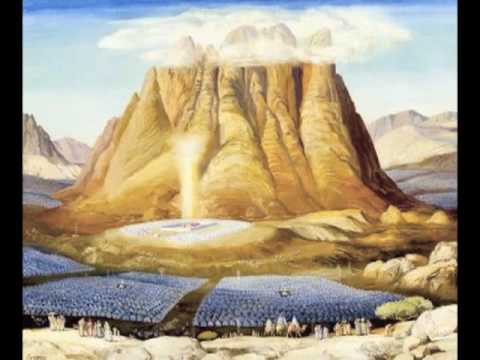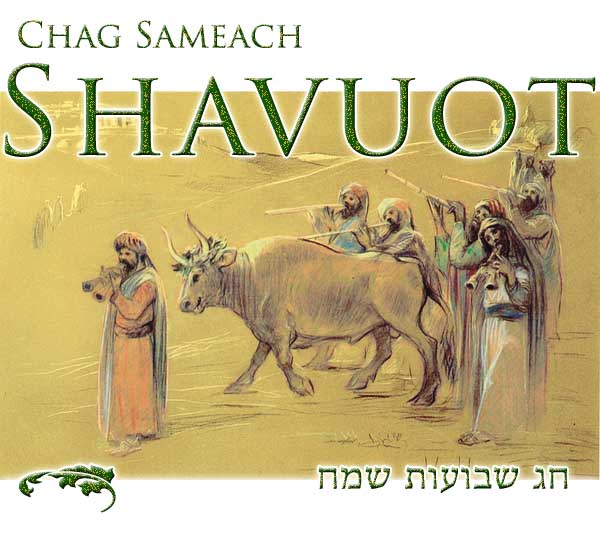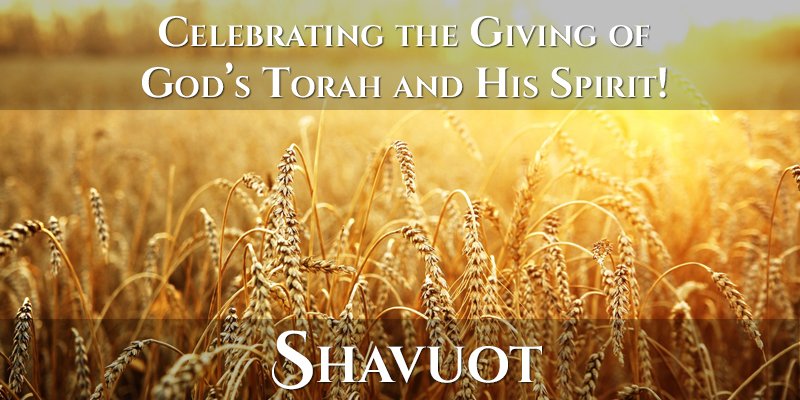Shavuotwith Information from

What Does The Word Shavuot Mean?“Shavuot” is the Hebrew word for “weeks.” The Torah tells us to count seven full weeks after the second day of Pasover to Shavuot. In ancient times, the Israelites were an agricultural people who brought sheaves of grain as gifts to the Temple for these seven weeks. On the fiftieth day, Shavuot, they brought loaves of bread made out of the new grain. The holiday is also called Hag HaBikkurim (Hebrew for Holiday of the First Fruit) as it marks the beginning of the fruit harvest when the first ripe fruits were brought to the Temple as an offering of thanksgiving. What Does The Holiday Of Shavuot Celebrate?Seven weeks after the Hebrew slaves left Egypt— seven weeks after Passover— the Israelites were transformed into the Jewish people when they received the Torah at Mt. Sinai. The tradition tells us that everyone who is a Jew today stood at the mountain with the children of Israel— and the “strangers in the camp” were there too (Deuteronomy 29:9-14).
How Was The Torah Created?The tradition tells us we received the Torah, the Five Books of Moses, at Mt. Sinai. In Exodus and Deuteronomy, there are several different versions of what happened. The sages have interpreted the different version in several ways:
Whichever interpretation(s) you believe, all agree that it was a unique spiritual experience. No matter what happened back then, we do know one thing. Somewhere, sometime, something occurred that was so awe-inspiring that a people was born, their belief system founded on the principle that they are holy, connected to one another and to the Source— whatever that may be— that conferred meaning on them and on life everywhere. And in response to that discovery, the Jews pledged themselves, individually and collectively, to join their will to God’s and to seek to increase holiness in the world. [Rabbi Nina Beth Cardin, The Tapestry of Jewish Time: A Spiritual Guide to Holidays and Life-Cycle Events.]
How is Shavuot Celebrated?Shavuot begins at sundown with a holiday meal which includes blessings for candles, the holiday kiddush (blessing over the wine) and shehechiyanu (prayer of gratitude for reaching this day). Because the Torah mentions the offering of two loaves of bread made from new grain, it is a custom to have two loaves of bread on the table. Some people bake two loaves of challah side-by-side, leaving them connected so they look like the two tablets of the commandments. It is customary to eat a dairy meal at least once during Shavuot. One reason is that it is a reminder of the promise that Israel would be a land flowing with “milk and honey.” Another reason might be because the Israelites abstained from eating meat as part of their purification before receiving the Torah. No one really knows how this tradition started, but it is a good excuse to indulge in dairy delicacies. Rice pudding and cheese-filled filo are common dishes in the Sephardic (Mediterranean) Jewish communities. Jews of Kurdistan prepare a dish with ground wheat cooked in sour milk and butter that is served with dumplings. In Triploi, women bake wafers in the shape of a ladder that helped Moses to the top of Mt. Sinai or in the shape of the tablets. Ashkenazi (European) Jews eat cheese filled crepes called blintzes and bake cheesecakes. In the medieval period, mystics from Safed studied all night in preparation for the opening of heaven at midnight. They believed they would hear the echo of the giving of the Torah. Some synagogues emulate this tradition with all-night study sessions, taking turns reading from the Torah and teaching each other until dawn. This ritual is called tikkun leil Shavuot (literally “healing for Shavuot night,” it is known as a “night of learning [for Shavuot]”). Families can replicate this custom and make Shavuot a time when children are allowed to stay up late reading bible stories or watching movies with biblical themes while enjoying dairy snacks. What is added to the regular synagogue service? Hallel, a collection of verses from Psalms, is traditionally chanted on all festivals. Before the Torah portion of the week, which includes the reading of the Ten Commandments, the Book of Ruth is read.
Names for ShavuotBecause it is a multifaceted holiday, Shavuot is given different names in the Scriptures and in the Jewish tradition: Chag Shavuot (“The Festival of Weeks”); the Hebrew word sheva means seven, shavu’ah means week, and Shavuot means weeks. Exodus 34:22; Deut. 16:10 Chag Hakatzir (“The festival of the Harvest) Exodus 23:16 Yom Habikkurim (“The Day of First Fruits”) Num. 28:26 (not to be confused with the festival of First Fruits (Lev. 23:9-12). Bikkurei Ketzir Chittim (“The first fruits of the wheat”) Exodus 34:22 Yom HaKahal (“The Day of Assembly”) Deut. 18:16 Z’man Mattan Torateinu “The season of the giving of the Torah” Anticipating RevelationThe two-month wait is nearly over now, and we anticipate a time to recommit our lives to the LORD God of Israel. On Shavuot Jews are commanded to remember the revelation given at Sinai (Deut. 4:9) and to spiritually reenact kabbalat ha-Torah (the receiving of the Torah). This is symbolic of a wedding day, when God betrothed Israel as His own people, separate from all others. The goal of Passover redemption was to set us free to become God’s own treasured people (am segulah), a light to the nations: ambassadors for Heaven’s voice... According to some of the sages, the entire Jewish nation will one day be saved from their spiritual exile on Shavuot. As Messianic Jews and gentiles alike, we understand that our Passover redemption was designed by God to set us free to become appointed heirs (κληρονομοι) with Yeshua (Jesus) and to identify with His redemptive purposes in the earth (Rom. 8:17, Titus 3:7, etc.). By God’s chesed we are now called God’s own treasured people (am segulah), a light to the nations: ambassadors for the Kingdom of God (1 Peter 2:9). We have been saved from or spiritual exile when the Ruach Ha-Kodesh (Holy Spirit) was given to us (Acts2). Exodus 14 – 17, RuthCollectively, the followers of Yeshua are called kallat Mashiach - the bride of the Messiah (2 Cor. 11:2, Rom. 7:4, Eph. 5:25-27, Rev. 21:9, 22:17). Presently we are living during a betrothal period in which the bride and groom are separated until the wedding. Our responsibility during this age is to be faithful to our Heavenly Bridegroom (2 Cor. 11:2; Eph. 5:24). When Yeshua returns, we will finally be united with Him and the glorious "wedding ceremony" will take place (Rev. 19:7-9; 21:1-2).
|
| (c) EWCMI 2009-2026 | Terms of Use | ||
| All Donations, Seeds, and Tithes to Eagle Wings Charismatic Ministries International are tax deductible per the Internal Revenue Code 501(c)(3) Public Charity Status 170(b)(1)(A)(i) DLN 17053243329039 | |||
 |
|||







 At Pesach (Passover), we are all encouraged to see ourselves as having been in Egypt. At Shavuot, we are encouraged to see ourselves as part of the crowd that stood at the foot of Mt. Sinai. You can get a sense of the awesome power of that encounter by reading the story starting with Exodus 18: “There was thunder and lightning, a thick cloud, the sound of a shofar (ram’s horn) and smoke. The earth itself quaked!” The Torah tells us that the people “saw the thunder.” So powerful was Sinai, our senses became interchangeable.
At Pesach (Passover), we are all encouraged to see ourselves as having been in Egypt. At Shavuot, we are encouraged to see ourselves as part of the crowd that stood at the foot of Mt. Sinai. You can get a sense of the awesome power of that encounter by reading the story starting with Exodus 18: “There was thunder and lightning, a thick cloud, the sound of a shofar (ram’s horn) and smoke. The earth itself quaked!” The Torah tells us that the people “saw the thunder.” So powerful was Sinai, our senses became interchangeable.
